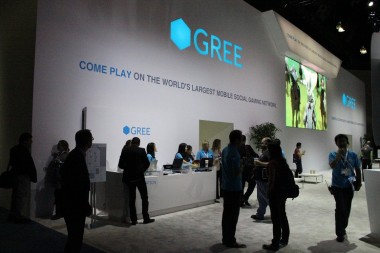Gree Who? See Which Company Had the Biggest-Smallest Booth at E3.

Perhaps you’ve never heard of Gree, but if you were at E3 this week, you probably saw that it made a huge splash.
Rumors started circulating early at the annual videogame conference that the Japanese company had the second-largest booth on the show floor — after Microsoft, that is.
The booth size is particularly ironic, given that Gree was showing off mobile games, likely the smallest games on the show floor.
 The monstrosity, which included both a public booth and executive meeting space, spanned about one and a half times the typical company’s showroom footprint. In the map above, you can see that the size of the booth rivals even those of gaming giants like Electronic Arts.
The monstrosity, which included both a public booth and executive meeting space, spanned about one and a half times the typical company’s showroom footprint. In the map above, you can see that the size of the booth rivals even those of gaming giants like Electronic Arts.
But it also turned out that the rumor wasn’t true. Officially, all I could find out was that Gree had the show’s largest mobile-only booth, and I was never able to track down how it ranked among all of the show’s exhibitors. Under those circumstances, I grant it the biggest-smallest booth award at E3.
But clearly the space was purchased to make a point, because Gree did not need that much territory.
While Gree was showing off games on 3.5-inch iPhones, which were zip-tied to various podiums over lush (i.e., expensive) carpeting, EA and Activision’s booths contained billboard-sized displays to promote upcoming HD titles like Madden and Call of Duty. Large booths like those typically have theaters, where attendees can stand in line for a chance to either get hands-on time with the games or watch more game footage.
That didn’t apply here, where there were no lines to play the games.
On Tuesday night, a Gree-hosted party was one of the most coveted tickets at the event. At a venue near the Los Angeles Convention Center, a packed crowd turned out to hear the DJ known as Girl Talk spin records.
So, what was all the fuss about?
 As many other companies are attempting to do, Gree’s goal is to become the social network for mobile games, similar to the way Facebook has become the social platform for games on the PC.
As many other companies are attempting to do, Gree’s goal is to become the social network for mobile games, similar to the way Facebook has become the social platform for games on the PC.
Gree was at E3 to stake its claim in the space, while also wooing developers.
Gree, which was founded in 2004, has a head start as one of the largest mobile social networks in Japan, generating $260 million in revenue in the fourth quarter alone. In 2011, it purchased OpenFeint in San Francisco, which marked its expansion into the U.S.; last month, it acquired San Francisco game developer Funzio. Together, the two acquisitions cost $310 million.
At the booth, Gree was showing off 13 games, five of which are first-party titles, with the remainder coming from outside developers. Some of the games are already available for individual download on iPhone and Android, including Zombie Jombie and Alien Family. This summer, the company plans to finally launch the mobile social network that will allow players from around the globe to compete against each other and discover games. Other companies that will be competing in this space include Facebook, Electronic Arts, DeNA, Apple and Google, to name a few.








